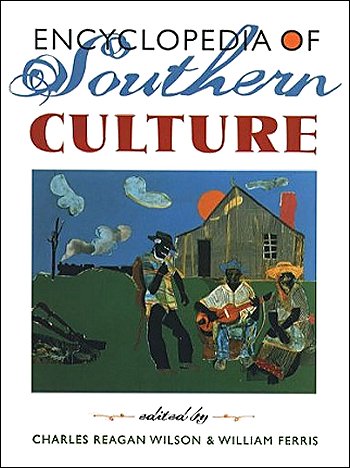Encyclopedia of Southern Culture (1989)

The Encyclopedia of Southern Culture was developed by the Center for the Study of Southern Culture at the University of Mississippi. Contributors to the volume include historians, literary critics, sociologists, anthropologists, geographers, linguists, theologians, folklorists, architects, ecologists, lawyers, university presidents, newspaper reporters, magazine writers and novelists.
An instant hit when it was published in 1989, the Encyclopedia of Southern Culture is “the first attempt ever” notes U.S. News & World Report, “to describe every aspect of a region’s life and thought, the impact of its history and policies, its music and literature, its manners and myths, even the iced tea that washes down its catfish and cornbread.” The Encyclopedia, a ten-year project involving more than 800 scholars and writers, offers an extraordinary portrait of one of the nation’s richest cultural landscapes and it features 349 illustrations and 15 maps.
To foster a deeper understanding of the South’s cultural patterns, the editors (Charles Reagan Wilson and William Ferris) have organized this reference book around twenty-four thematic sections, including history, religion, folklore, language, art and architecture, recreation, politics, the mythic South, urbanization, literature, music, violence, law, and media.
The life experiences of southerners are discussed in sections on black life, ethnic life, and women’s life. Throughout, the broad goal is to identify the forces that have supported either the reality or the illusion of the southern way of life—people, places, ideas, institutions, events, symbols, rituals, and values.
Alex Haley contributed to the September 18, 1989 edition of Encyclopedia of Southern Culture by writing the following foreword:
Foreword By Alex Haley
Can you remember those southern elder men who “jes’ set” in their favored chair or bench for hours, every day—and a year later they could tell you at about what time of day someone’s dog had trotted by? And the counterpart elderly ladies, their hands deeply wrinkled from decades of quilting, canning, washing collective tons of clothing in black cast-iron pots, in which at other seasonal times pork fat was rendered into lard, or some of that lard into soap? These southern ancestors, black and white, have always struck me as the Foundation Timbers of our South, and I think that we who were reared and raised by them, and amongst them, are blessed that we were.
I consider this Encyclopedia of Southern Culture the answer to a deep need that we resuscitate and keep alive and fresh the memories of those who are now bones and dust, who during their eras and in their respective ways contributed toward the social accretion that has entered legend as “the southern way of life,” which we continue today.
It is a culture resulting from the antebellum mixture of social extremes based on the chattel slavery that supported an aristocratic gentility; in between the slaves and planters a vast majority struggled for their own survival. Centuries of slavery were abolished by an indelible war whose legacies continue to haunt us. The southern memory is of generations of life, of the good and the bad, the humor and the suffering from the past. The southerner does not sentimentalize but only remembers.
Out of the historic cotton tillage sprang the involuntary field hollers, the shouts, and the moanin’ low that have since produced such a cornucopia of music, played daily, on every continent, where I have been astounded at how much I heard of the evolved blues, jazz, and gospel—as well as bluegrass and country—all of them of direct southern origin.
Equally worldwide is southern literature. Writers took the oral traditions of the South—the political rhetoric, preaching, conversational wordplay, and lazy-day storytelling—and converted them into art. The latest addition to southern literature is this Encyclopedia, no small part of whose greatness, I think, is that it is compiled by many researchers who did not simply read books but who rubbed shoulders with those whom they interviewed and recorded and studied. They walked and talked with the sharecropper farmers, the cooks, the quiltmakers, the convicts, the merchants, the fishermen, and all the others who make these pages a volume of living memories.
The region and its people have undergone dramatic changes in the last decades, overcoming much, although not all, of the poverty of the past, and they are now sharing in the nation’s prosperity. Old ways that divided the people have fallen away to be replaced by new dreams. The hard lessons from the past are not forgotten in this Encyclopedia. I testify that this Encyclopedia of Southern Culture mirrors the very best of what has lately come to be called “the new South.” Never before has such a volume been produced by such a team so committed to distilling and presenting our southern distinctiveness. ~ Alex Haley.
(The above Alex Haley foreword is presented under the Creative Commons License. Encyclopedia of Southern Culture was edited by Charles Reagan Wilson and William R. Ferris. © 1989 The University of North Carolina Press. All Rights Reserved.)